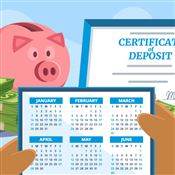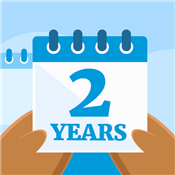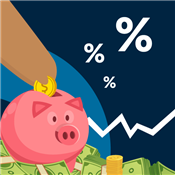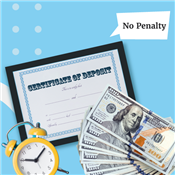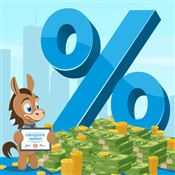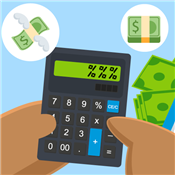Best 1 Year CD Rates for January 2026
Ad Disclosure: This article contains references to products from our partners. We may receive compensation if you apply or shop through links in our content. This compensation may impact how and where products appear on this site. You help support CreditDonkey by using our links.
Save for next year with a 1-year CD. Here are some of the best 1-year CD rates today.
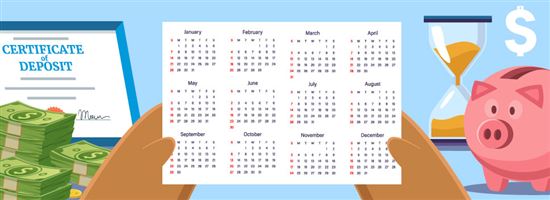 |
Here are some banks and credit unions with the best 1-year CD rates:
- Western Alliance Bank:
3.30% APY
Want a secure place to park your savings for the next year?
A 1-year CD can be a good way to store funds and earn fixed interest at the same time. It is a low-risk investment that lets you lock in high rates for a year.
Check out who pays the highest 12-month CD rates, and alternatives to consider.
PRO TIP: Currently, one of the highest rates on a 1-year CD is with Western Alliance Bank at an impressive 3.30% APY.
12-Month High-Yield CD - 3.30% APY
- No fees
- $1 minimum deposit
- 24/7 online access
- FDIC insured
What is a 1-Year CD?
A 1-year CD (also known as a 12-month CD) is a savings account where you deposit a fixed amount of money for one year in exchange for a fixed APY. Typically, you get a higher APY compared to a simple savings account.
You usually can't withdraw your money until the CD matures. It's like a contract to lock in your money for one year. If you withdraw early, you might face penalties that can go up to 90 days' worth of interest.
1-year CDs are one of the most popular CD terms available in the market so you have plenty of options if you're looking for one.
One of the highest rates on a 1-year CD is Western Alliance Bank:
How much interest does a 1-year CD earn?
With $25,000 in a 1-year CD with 5% APY, you'd earn $1,250 when the CD matures. How much you earn depends on what your APY is and the amount in your CD.
Here's a table to illustrate how the APY and amount impact what you earn on a 1-year CD.
| $10,000 | $25,000 | $50,000 | |
|---|---|---|---|
| 0.00% | $10,000 | $25,000 | $50,000 |
| 0.50% | $10,050 | $25,125 | $50,250 |
| 1.00% | $10,100 | $25,250 | $50,500 |
| 1.50% | $10,150 | $25,375 | $50,750 |
| 2.00% | $10,200 | $25,500 | $51,000 |
| 2.50% | $10,250 | $25,625 | $51,250 |
| 3.00% | $10,300 | $25,750 | $51,500 |
| 3.50% | $10,350 | $25,875 | $51,750 |
| 4.00% | $10,400 | $26,000 | $52,000 |
| 4.50% | $10,450 | $26,125 | $52,250 |
| 5.00% | $10,500 | $26,250 | $52,500 |
| 5.50% | $10,550 | $26,375 | $52,750 |
Here's a simple CD calculator you can use to check how much you can earn on a CD.
Is a 1-Year CD Worth It?
A 1-year CD is worth considering if you already have money saved and don't need it for at least a year. It provides a secure place to park your funds and earn steady passive income.
Plus, if you worry about interest rates dropping, a CD can give you some peace of mind since your rate is fixed.
But if you need easy access to your money, consider other options like a high-yield savings account instead.
Or consider other term CDs based on your savings goals.
Here are some of the top CD rates by term:
| Term | Bank and Yield Rate |
|---|---|
| 3 Month | Western Alliance Bank: |
| 6 Month | Western Alliance Bank: |
| 9 Month | Western Alliance Bank: |
| 1 Year | Western Alliance Bank: |
High 1-year CD rates are usually offered by online banks and credit unions. Online banks can give great rates because of their lower overhead costs. Credit unions can offer the same as they are non-profit institutions.
Can I Lose Money on a 1-Year CD?
In most cases, you won't lose money on a 1-year CD. Your deposits are federally insured for up to $250,000 for banks or credit unions that are FDIC or NCUA members. That means your funds are covered in case your bank or credit union fails.
However, you may lose money on a CD from early withdrawal fees if you withdraw before maturity.
Yes. Because CDs are typically federally insured, they are one of the safest investments available.
Pros and Cons of a 1-Year CD
Pros
- Lock in high interest rates.
You get high, fixed interest rates during the 1-year CD term. This means your rate stays the same regardless of the market changes throughout the year. - Low-risk.
A 1-year CD is a safe, low-risk investment. Funds deposited in your CD are federally insured and returns are guaranteed.
12-Month High-Yield CD - 3.30% APY
- No fees
- $1 minimum deposit
- 24/7 online access
- FDIC insured
Cons
- Early withdrawal penalties.
Remember with 1-year CDs, your money is locked in for 12 months. You usually can't move your funds without paying early withdrawal penalties. - Miss out on better rates.
Interest rates can go up in one year. If you're already locked in a 1-year CD with a lower APY, you can miss out on higher earnings. - Limited flexibility
You can't add more money to a CD once you open and fund it. Nor can you pull out your money early without paying penalties. If you need flexibility, you might want to consider a regular high-yield savings account.
High Yield Savings Account - 3.80% APY
- No fees
- $1 minimum deposit
- 24/7 online access
- FDIC insured
Like most CDs, you cannot withdraw from your 1-year CD without paying penalties. But if you'll need to withdraw early, consider no-penalty CDs to avoid early withdrawal fees.
How to Choose the Best 1-Year CD
If you're on the hunt for a 1-year CD, here are three questions to filter your choices:
- What is the APY?
The good news is some of the best CD rates are offered on 1-year CDs. Consider on online banks and credit unions for the highest rates. - What is the minimum deposit required?
Some CDs have minimum deposit requirements, ranging from just $1 to $100,000 for Jumbo CDs. Choose a CD that fits your budget. - How much is the early withdrawal penalty?
Penalties for 1-year CDs can range from 60 to 90 days worth of interest. If you might need to close your CD early, look for CDs with lower penalties. Better yet, find no-penalty CDs to avoid paying any fees.
Alternatives to 1-year CDs
A 1-year CD might not be the best option for you, here are alternatives you can consider:
High-Yield Savings Account
Try getting a high-yield savings account if access to your funds is important. You get the flexibility to add and withdraw funds at any time. These are good for short-term goals, emergencies, or simply savings. But rates may change over time, unlike CDs.
- Valley National Bank:
High-Yield Savings Account - 3.95% APY - Mission Valley Bank:
High Yield Savings Account - 3.86% APY - Western Alliance Bank:
High Yield Savings Account - 3.80% APY
Treasury Securities
To lock in rates for a year like 1-year CDs, check out Treasury bills, notes, and bonds. These are backed in full faith by the government, making them a safe and reliable investment for a year.
No-Penalty CDs
If you're not sure about tying up your money, no-penalty CDs let you withdraw before the term ends with no early withdrawal fees. Think of it like a savings account with locked-in returns.
- Raisin:
No-Penalty CD - Up to $1,500 Bonus - Mission Valley Bank:
3-Month No-Penalty CD - 3.80% APY - CIT Bank No Penalty CD:
3.75% APY - Sallie Mae Bank:
14-Month No Penalty CD - 3.40% APY
Longer-term CDs
If you can go beyond 1 year, some longer-term CDs offer competitive rates and minimal to no deposit requirements. You can look for no-penalty CDs with longer terms to get flexibility and avoid early withdrawal fees.
- Sallie Mae Bank:
27-Month High-Yield CD - 3.75% APY
Shorter-term CDs
On the flip side, if one year is too long, you can go for short-term CDs. Some shorter terms might even have higher rates than 1-year CDs.
- Western Alliance Bank:
3-Month High-Yield CD - 3.60% APY - Sallie Mae Bank:
10-Month High-Yield CD - 3.55% APY
The rule of thumb is to get a CD when interest rates are at their highest. CD rates typically move with the Fed Funds rate. Thus, following their trend can help you decide when to get a 1-year CD.
1-year CD FAQs
Is a 1-year CD better than a savings account?
If you need easy access to your money, choose a savings account. If not, consider a 1-year CD to lock in potentially higher rates. Both are FDIC-insured, as long as your bank or credit union is an FDIC or NCUA member.
What happens at the end of a 1-year CD?
Your bank or credit union usually will notify you if your CD is about to mature. Before it does, decide if you want to:
- Automatically renew the CD.
- Renew the CD with a different amount, term, or both.
- Withdraw all your funds and close the CD.
Make sure to inform your bank before or during the grace period after your CD matures. Otherwise, the CD might renew and early withdrawal penalties will already apply.
How do I use a 1-year CD in a CD Ladder?
CD laddering is a strategy where you break up your money into multiple CDs. This way you have CDs mature intervals and get the flexibility to use or reinvest your money.
To build a CD ladder, you'd want a variety of short-term and longer-term CDs. For example, you might open 3-month, 6-month, 9-month, and 1-year CDs.
Here's a CD ladder calculator you can use to help build yours.
What CD term should I choose?
The CD term you choose will highly depend on your financial goals. CD terms range from 1 month to 10 years, so you have many options to match your goals.
What the Experts Say
CreditDonkey asked a panel of industry experts to answer readers' most pressing questions. Here's what they said:
Bottom Line
For a guaranteed passive income in the next year, a 1-year CD could be a good option. Check out Western Alliance Bank:
However, whether or not you should open one depends on your financial goals and situation. Early withdrawal penalties might still be a problem, so make sure you can commit to the 1-year term before you choose this CD.
3-Month No-Penalty CD - 3.80% APY
- $1 minimum deposit
- No fees
- 24/7 online access to funds
- FDIC insured
Write to Rue Atanacio at feedback@creditdonkey.com. Follow us on Twitter and Facebook for our latest posts.
Note: This website is made possible through financial relationships with some of the products and services mentioned on this site. We may receive compensation if you shop through links in our content. You do not have to use our links, but you help support CreditDonkey if you do.
|
|
| ||||||
|
|
|


